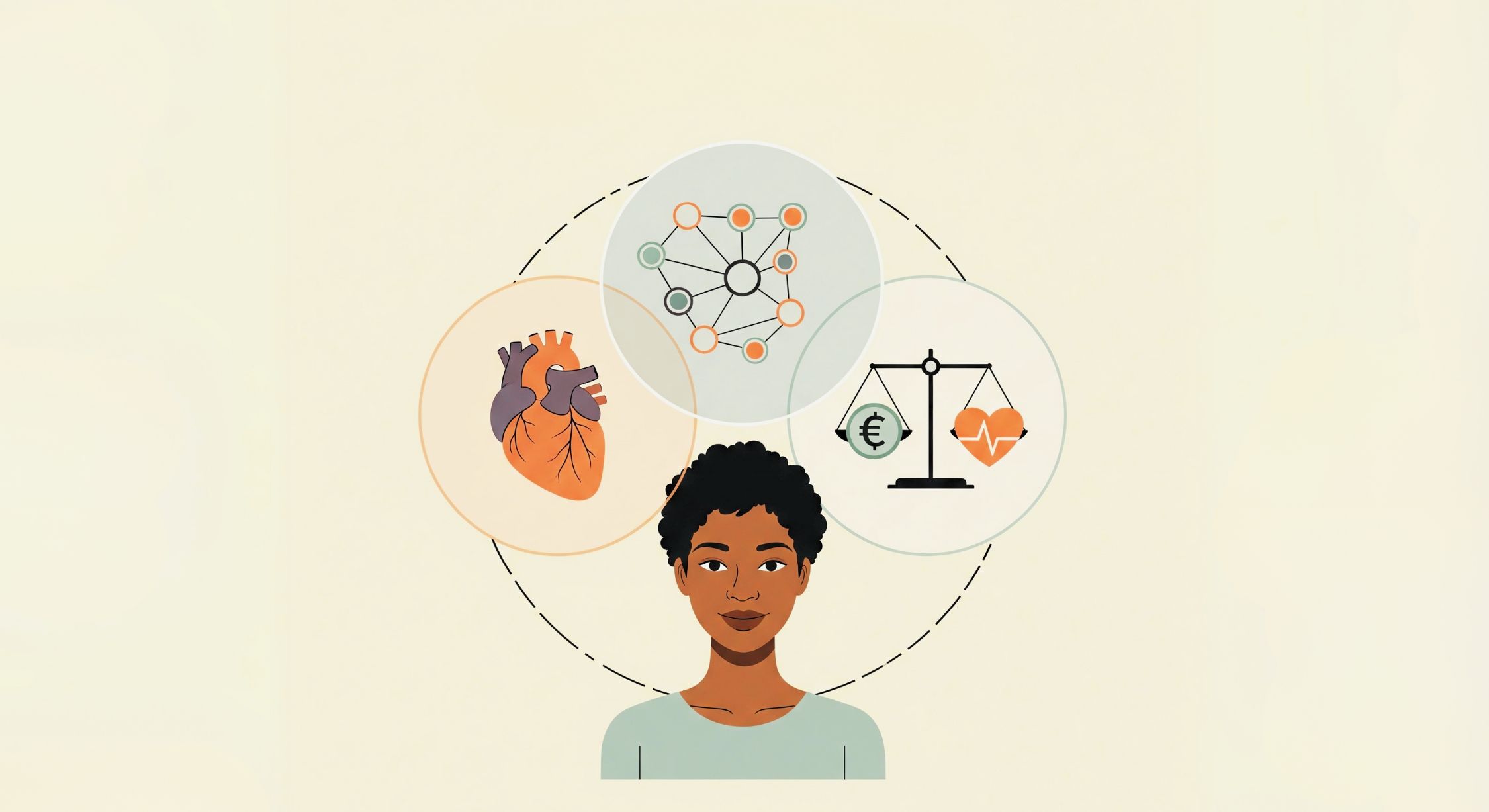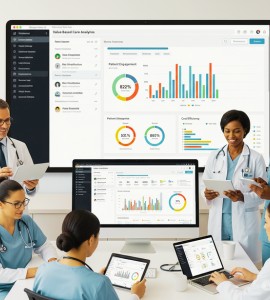What if your next care decision could be guided not by guesswork, but by millions of patient journeys that came before it? At Experion Technologies, we help healthcare organizations turn that “what if” into reality, by transforming scattered health data into powerful, predictive insight through value based care analytics.
As healthcare pivots from volume to value, one truth is clear: you can’t improve what you don’t measure. That’s why value based care needs more than good intent, it needs precision, visibility, and the ability to act fast on what the data reveals. This blog explores how value based care analytics is the engine behind this transformation, and how the right technology partner can help you harness it at scale.
What is Value Based Care?
 The value based care model marks a bold departure from the legacy of healthcare built on volume. Instead of reimbursing providers for every appointment, test, or intervention, regardless of outcome, value based care flips the script: it rewards better results, not more procedures.
The value based care model marks a bold departure from the legacy of healthcare built on volume. Instead of reimbursing providers for every appointment, test, or intervention, regardless of outcome, value based care flips the script: it rewards better results, not more procedures.
At its heart, value based care is about aligning clinical decisions with what matters most, patient outcomes, not just billing codes.
Core Principles Driving the Shift:
- Patient-Centric Outcomes: The focus is on measurable improvements in health, recovery, and quality of life, rather than transactional metrics like the number of tests run.
- Cost Efficiency: The model aims to eliminate unnecessary treatments, reduce ER visits, and minimize readmissions by catching issues early and managing chronic conditions proactively.
- Care Coordination: Seamless collaboration across GPs, specialists, behavioral health, and social care teams ensures every handoff is informed and every decision is cohesive.
This transition is more than a funding overhaul, it’s a philosophical realignment. The value based care strategy prioritizes preventive care, proactive management, and integrated support over episodic, reactive interventions.
By shifting to a value based care model, healthcare systems can rewire themselves around what truly matters: outcomes, experience, and sustainability. But to achieve this, data must be at the center, making value based care analytics not just helpful, but absolutely essential.
The Rise and Need for Value Based Care Analytics in Healthcare
Shifting to a value based care model is not just a strategic pivot, it’s a data-intensive transformation. You can’t deliver measurable outcomes, reduce costs, or personalize care at scale without first turning data into action. And that’s exactly what value based care analytics enables.
Think of it this way: implementing value based care without analytics is like flying blind. The success of any value based care strategy hinges on the ability to make sense of massive datasets, spanning clinical records, claims data, remote monitoring inputs, and even social determinants of health. Healthcare providers can no longer afford to simply look in the rear-view mirror. They need real-time insights and foresight to truly operationalize value.
The Role of Data in Value Based Care Analytics
Value based care data analytics plays a pivotal role in helping organizations:
- Measure Outcomes: Analytics platforms can track key performance indicators (KPIs) such as patient satisfaction scores, 30-day readmission rates, A1C levels in diabetic populations, or blood pressure control in hypertensive cohorts.
- Drive Cost Efficiency: Identifying patterns in over-utilized services, low medication adherence, or redundant diagnostic testing allows health systems to intervene early and save costs.
- Boost Patient Engagement: Advanced analytics can surface behavioral and social insights, like housing insecurity or language barriers, that impact care delivery and health outcomes. This deeper visibility supports truly personalized, equitable care plans.
From Descriptive to Prescriptive Analytics
Legacy analytics tools provided descriptive snapshots, answering questions like “What happened last month?” or “Which procedures cost the most?”
Modern value based care analytics software, however, goes further by offering:
- Predictive Analytics: Identifying patients at risk for complications or hospitalizations before they occur. For example, flagging a heart failure patient likely to be readmitted within 30 days.
- Prescriptive Analytics: Recommending the best course of action, such as scheduling follow-ups, adjusting medications, or triggering nurse outreach based on real-time vitals.
- Cognitive Insights: With the help of AI and machine learning, advanced platforms continuously learn from new data, enabling dynamic care recommendations that evolve with each patient’s journey.
This transformation from retrospective analysis to forward-looking decision support is what gives value based care data analytics its power. It turns data from a static resource into a real-time ally in improving outcomes and delivering care that is not just efficient, but intelligent.
Value Based Care Strategy: Aligning Data with Outcomes
 Crafting a successful value based care strategy isn’t simply about collecting data, it’s about putting that data to work in ways that directly improve outcomes, lower costs, and enhance patient experiences. For healthcare organizations navigating the transition from volume to value, the strategy must go beyond dashboards. It needs to tightly align clinical, operational, and financial goals using the power of value based care analytics.
Crafting a successful value based care strategy isn’t simply about collecting data, it’s about putting that data to work in ways that directly improve outcomes, lower costs, and enhance patient experiences. For healthcare organizations navigating the transition from volume to value, the strategy must go beyond dashboards. It needs to tightly align clinical, operational, and financial goals using the power of value based care analytics.
At Experion Technologies, we bring deep healthcare domain knowledge and analytics expertise to help organizations translate the promise of value based care into measurable success. Whether it’s enabling cohort analysis or building custom dashboards tied to outcome-based goals, we ensure your analytics backbone is built for both compliance and care excellence.
Key Strategic Elements of a High-Impact Value Based Care Model
- Setting Measurable Goals
Value based care thrives on accountability. That starts by defining clear, quantifiable objectives, such as improvement in HEDIS (Healthcare Effectiveness Data and Information Set) measures, elevated CMS Star Ratings, or better patient-reported outcome measures (PROMs). These targets become the north star for all data analysis and care delivery efforts. - Data-Driven Clinical Decisions
With real-time access to patient history, comorbidity trends, medication adherence, and lifestyle factors, value based care data analytics enables care teams to make proactive, evidence-based decisions. This ensures not only better health outcomes but also optimized use of clinical resources. - Risk Stratification
One-size-fits-all healthcare doesn’t work in a value-based environment. By segmenting patient populations based on clinical risk (e.g., chronic illness), behavioral tendencies (e.g., missed appointments), and financial vulnerability, care teams can tailor interventions to those who need them most. - Cohort Analysis
Analyzing patients in cohorts, whether by age, diagnosis, or care utilization, helps identify what’s working and what’s not. For instance, diabetic patients on a specific medication protocol may show improved A1C control compared to others, prompting care protocol refinements. - Case Management and Care Coordination
Successful value based care models depend on seamless coordination between specialists, primary care, behavioral health, and post-acute providers. Analytics can automatically flag patients for follow-up after discharge, track longitudinal progress, and ensure no one falls through the cracks.
By tying each of these strategies to specific, trackable outcomes, healthcare organizations can evolve from reactive treatment to proactive, predictive care, turning analytics into a competitive advantage.
Value Based Care Analytics Software: Key Capabilities and Benefits
 Value based care analytics software is the backbone of any modern, outcomes-focused healthcare organization. It’s no longer enough to have data, you need the tools to turn that data into decisions, and those decisions into action. The best platforms today go far beyond simple reporting; they empower dynamic, data-driven care at every level. At Experion, we develop custom analytics solutions that fit seamlessly within your existing infrastructure, whether you’re integrating EHRs, handling claims, or deploying remote monitoring tools.
Value based care analytics software is the backbone of any modern, outcomes-focused healthcare organization. It’s no longer enough to have data, you need the tools to turn that data into decisions, and those decisions into action. The best platforms today go far beyond simple reporting; they empower dynamic, data-driven care at every level. At Experion, we develop custom analytics solutions that fit seamlessly within your existing infrastructure, whether you’re integrating EHRs, handling claims, or deploying remote monitoring tools.
Must-Have Features of a Modern Analytics Platform
- Dashboards & KPI Tracking
Real-time visibility into provider-level performance, cost metrics, and quality benchmarks allows administrators and clinicians to course-correct instantly. Whether tracking preventable ER visits or adherence to clinical pathways, dashboards drive accountability. - Patient Journey Mapping
Track the full continuum of care, from hospitalization and outpatient treatment to telehealth and home care. Visualizing this journey allows care teams to identify gaps, reduce fragmentation, and ensure consistency in patient experience. - Claims & EHR Integration
Seamlessly connecting disparate systems, especially claims and electronic health records (EHRs), is foundational to a successful value based care analytics strategy. This integration eliminates data silos and supports real-time, actionable insights with a unified patient view. - Remote Monitoring and IoT Data
Integration with wearables, sensors, and connected devices enables providers to track patient vitals, medication adherence, and activity levels outside of clinical settings. This continuous flow of data enhances chronic care management and reduces readmissions. - Regulatory and Compliance Reporting
Automation tools within analytics platforms help generate compliance-ready reports for CMS, NCQA, and other bodies, streamlining audit trails and reducing administrative burdens. Timely, accurate submissions can also impact reimbursement levels directly.
Our value lies in making complex analytics work in the real world. We don’t just implement tools, we co-create solutions with clinical and operational teams to ensure your value based care analytics is not only functional, but transformative. Whether you’re piloting a care coordination model or scaling up a full value based care model, Experion stands beside you as a trusted innovation partner.
The Unified View: Why This Matters
When these capabilities come together under a single platform, value based care analytics software offers more than convenience, it provides transformational insight. Providers and payers gain a comprehensive view of patient health, service utilization, and cost-efficiency. This enables more strategic planning, smarter interventions, and ultimately, better patient outcomes.
By embedding this intelligence into daily workflows, health systems can move from reactive problem-solving to continuous value creation, a true embodiment of the value based care model.
AI in Value Based Care: Turning Intelligence Into Action

Artificial Intelligence is no longer an emerging trend in healthcare, it’s the force multiplier that accelerates the success of every value based care strategy. By embedding AI across analytics workflows, providers and payers can elevate both clinical and operational impact, from identifying high-risk populations to automating administrative processes and enabling predictive interventions.
At Experion Technologies, we specialize in embedding AI into value based care analytics solutions to drive smarter decision-making, streamline workflows, and create deeply personalized care journeys.
How AI Enhances Value Based Care Analytics
- Predictive Modeling
AI algorithms analyze historical and real-time data to forecast patient outcomes, disease progression, and care utilization patterns. This allows healthcare teams to anticipate needs before crises arise, proactively preventing adverse events and unplanned hospitalizations. - Natural Language Processing (NLP)
Vast amounts of patient information are buried in unstructured sources, physician notes, discharge summaries, and patient feedback. NLP models extract actionable insights from this data, enabling a richer understanding of patient context and social determinants. - Automation of Operational Workflows
Tedious, error-prone tasks like claims coding, prior authorizations, and pre-visit planning are streamlined with AI-driven automation, freeing up clinician time and improving accuracy. - AI-Powered Chatbots and Virtual Care Tools
AI agents provide 24/7 engagement, triaging symptoms, scheduling appointments, answering FAQs, and guiding patients through care journeys. These digital touchpoints enhance accessibility and reduce the burden on call centers and front-line staff.
Ethical and Regulatory Considerations in AI-Powered Analytics
As AI becomes foundational to value based care analytics software, it’s essential to address concerns around fairness, transparency, and compliance.
- Ethics & Bias Mitigation
Experion ensures that predictive models are built with diverse data and tested for fairness. We help healthcare organizations avoid algorithmic bias that could disproportionately affect underserved populations. - Privacy & Data Protection
Our solutions are designed in alignment with major regulatory frameworks including HIPAA, GDPR, and Australia’s Privacy Act. Role-based access control, end-to-end encryption, and audit logging are integral to our deployments.
Benefits of Implementing Value Based Care Analytics
When implemented with precision, value based care data analytics drives tangible, measurable impact across all healthcare stakeholders, enhancing clinical care, streamlining operations, and boosting financial sustainability.
For Providers
- Personalized Care Delivery:
Providers can tailor treatment plans to individual patients, supported by data from EHRs, remote monitoring, and predictive models. - Operational Efficiency:
Reduce duplicative tests and manual processes, freeing up time for high-value tasks. - Clinical Decision Support:
Leverage real-time alerts and insights to prevent errors, reduce variability in care, and improve safety.
For Payers
- Cost Transparency & Utilization Management:
Analytics platforms enable visibility into service usage and costs, supporting smarter reimbursements and plan designs. - Contract Optimization:
With richer cost-performance data, payers can negotiate value-based contracts with confidence. - Member Retention:
Personalized outreach and timely interventions improve outcomes and satisfaction, reducing churn.
For Patients
- Improved Outcomes:
Data-backed care coordination leads to fewer complications, better recovery timelines, and fewer hospital visits. - Empowered Engagement:
With digital tools and education, patients become active participants in their health journey. - Continuity of Care:
Data-driven alerts and monitoring ensure that care doesn’t stop at discharge or between visits.
At Experion, we believe that the intersection of AI and value based care is where true healthcare transformation begins. Our analytics frameworks are engineered not only to deliver performance metrics but to foster meaningful, people-first outcomes, empowering every stakeholder in the healthcare ecosystem.
Challenges in Value Based Care Analytics Adoption
Despite the promise, the road to value based care analytics software adoption is not without friction.
Common Barriers:
- Data Silos
Interoperability remains a hurdle between payers, providers, and care teams. - Change Management
Clinicians may resist adopting data tools without proper training or perceived value. - Compliance Complexity
Navigating state, federal, and payer-specific requirements increases workload. - Cost vs. ROI
Upfront investment in analytics infrastructure can be high, especially for small providers.
Overcoming these requires strategic planning, platform modernization, and collaborative implementation.
Future Trends in Value Based Care Analytics
 As healthcare continues its transformation from reactive treatment to proactive, personalized wellness, the role of value based care analytics will expand from supporting decision-making to driving it. With the right tools, insights, and technologies, organizations can stay ahead of the curve, not just meeting performance metrics, but exceeding patient expectations.
As healthcare continues its transformation from reactive treatment to proactive, personalized wellness, the role of value based care analytics will expand from supporting decision-making to driving it. With the right tools, insights, and technologies, organizations can stay ahead of the curve, not just meeting performance metrics, but exceeding patient expectations.
Emerging Trends Defining the Next Chapter of Value Based Care
- Hyper-Personalization at Scale
Machine learning models are enabling a new frontier of individualized medicine. No longer limited to generalized care plans, analytics can now deliver patient-specific treatment strategies based on clinical history, real-time vitals, behavioral trends, and even genomic data. This elevates care quality while keeping costs in check, aligning perfectly with the core tenets of the value based care model. - Wearable & IoT Data Integration
With smartwatches, biosensors, and remote monitors generating millions of data points per patient, the future of value based care data analytics lies in continuous, real-time insight. Providers can detect early signs of deterioration, monitor chronic conditions remotely, and intervene before costly hospitalizations occur, shifting the model from reactive to preventive care. - Open APIs and Platform Interoperability
For value based care analytics software to thrive, it must seamlessly integrate with existing EHRs, payer systems, lab platforms, and remote devices. Open APIs and data standards like FHIR enable a connected ecosystem where insights flow effortlessly, without compromising patient privacy or data ownership. - Social Determinants of Health (SDOH) Integration
The future of value based care strategy is not just clinical. Environmental, economic, and social factors increasingly influence patient outcomes. Advanced analytics will embed SDOH into risk models, enabling more equitable and impactful interventions across diverse communities.
How Experion Can Help With Value Based Care Analytics
 At Experion Technologies, we don’t just build dashboards, we build intelligence ecosystems. Our goal is to empower providers, payers, and population health agencies to fully harness the power of value based care analytics, driving better care, optimized operations, and measurable outcomes.
At Experion Technologies, we don’t just build dashboards, we build intelligence ecosystems. Our goal is to empower providers, payers, and population health agencies to fully harness the power of value based care analytics, driving better care, optimized operations, and measurable outcomes.
Our Capabilities Include:
- End-to-End Analytics Platform Development
We deliver custom value based care analytics software tailored to your specific population, regulatory landscape, and integration needs. From KPI dashboards to real-time alerting, our platforms are built for impact and scalability. - Smart Cohort Management & Risk Stratification
Experion enables advanced segmentation using predictive scoring. Care teams can identify high-risk patients, monitor them over time, and prioritize interventions, maximizing outcomes and minimizing unnecessary spend. - Compliance-Ready Data Infrastructure
We design systems that adhere to HIPAA, HL7, FHIR, and regional regulatory standards, ensuring your value based care model remains secure, transparent, and audit-ready across all stakeholders. - AI-Powered Intervention Engines
Whether it’s missed appointments, medication non-adherence, or unclosed care gaps, our intervention engines proactively flag risks and drive automated, personalized engagement via email, SMS, or AI chatbots. - Connected Ecosystem Architecture
With deep expertise in data integration, Experion can connect EHRs, wearable devices, claims platforms, and telehealth services into a unified analytics fabric, powering end-to-end value based care strategy.
Conclusion: Analytics Is the Engine Behind Value Based Care
The shift from volume to value in healthcare is no longer theoretical, it’s happening. But making value based care a reality takes more than intention. It takes action. Specifically, it requires value based care data analytics that connect the dots between patients, providers, payers, and outcomes.
As healthcare organizations grapple with rising costs, growing patient expectations, and regulatory demands, value based care analytics software becomes not just helpful, but essential. It transforms raw data into clear insight. It empowers care teams to intervene earlier, treat smarter, and spend better.
With analytics, value based care isn’t just a model. It’s a movement.
Key Takeaways
- Value based care shifts the focus from fee-for-service to outcome-driven delivery, requiring robust, data-powered strategies to succeed.
- Value based care analytics enables healthcare organizations to personalize treatment, reduce waste, and improve operational decisions.
- Advanced platforms integrate wearables, AI, NLP, and EHRs to deliver a 360-degree view of patient health and provider performance.
- Challenges like interoperability, cost, and compliance must be addressed through thoughtful implementation and scalable technology.
- Experion Technologies is your trusted partner for next-gen value based care analytics software, equipping you to lead in an increasingly data-driven, patient-centered healthcare ecosystem.
Value-Focused & Reassuring
Better data. Smarter care. Stronger outcomes.
Choose Experion as your partner in building value based care analytics platforms that deliver results, clinically, financially, and operationally.

